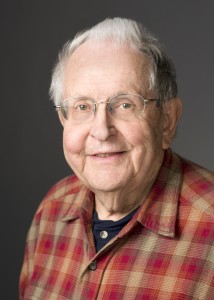To Mars in Weeks by Thermonuclear Micro-Bomb Propulsion
Friedwardt Winterberg
Tuesday, April 2, 2013 2:00 P.M. in the H.J.E. Reid Auditorium
Abstract
To reduce the radiation hazard for manned missions to Mars and beyond, a high specific impulse-high thrust system is needed, with a nuclear bomb propulsion system the preferred candidate. Propulsion with small fission bombs is excluded because the critical mass requirement leads to extravagant small fission burn up rates. This leaves open the propulsion with non-fission ignited thermonuclear micro-explosions, with a compact fusion micro-explosion igniter (driver), and no large radiator. It should not depend on the rare He3 isotope, and only require a small amount of tritium. This excluded lasers for ignition. With multi-mega-ampere-gigavolt proton beams and a small amount of tritium, cylindrical deuterium targets can be ignited. The proton beams are generated by discharging the entire spacecraft as a magnetically insulated gigavolt capacitor. To avoid a large radiator, needed to remove the heat from the absorption of fast neutrons in the spacecraft, the micro-explosion is surrounded by a thick layer of liquid hydrogen, stopping the neutrons and heating the hydrogen to ~105 K, which as a fully ionized plasma can be repelled from the spacecraft by a magnetic mirror.

Speaker
Friedwardt Winterberg is a German-American theoretical physicist and research professor at the University of Nevada, Reno. With more than 260 publications and three books, he is known for his research in areas spanning general relativity, Planck scale physics, nuclear fusion, and plasmas. His work in nuclear rocket propulsion earned him the 1979 Hermann Oberth Gold Medal of the Wernher von Braun International Space Flight Foundation and in 1981 a citation by the Nevada Legislature. He is also an honorary member of the German Aerospace Society Lilienthal-Oberth. He received his MSc from the University of Frankfurt and his PhD in physics from the Max Planck Institute as a student of Werner Heisenberg.
Additional information about the speaker is available at his wikipedia page.